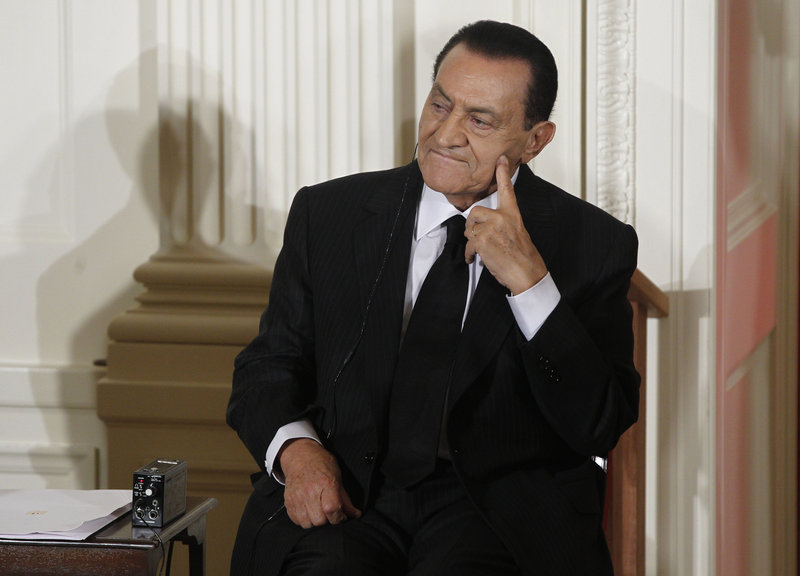CAIRO — Egypt’s prosecutor general ordered Tuesday former President Hosni Mubarak put on trial on charges of corruption and conspiring in the deadly shooting of protesters during the uprising that ousted him, a stunning step against a leader whose power was nearly unquestioned for three decades.
The announcement that Mubarak would face a criminal court grants a major demand of Egyptians who have threatened a second revolution amid growing worries about the slow pace of change under the country’s new military rulers. The charges could carry the death sentence, said the prosecutor-general spokesman Adel el-Said.
It would be the first time an Arab leader is sent to trial solely by his own people in modern history. Iraq’s leader Saddam Hussein was toppled during the U.S. invasion in 2003 and sentenced three years later to death for killing 140 Shiites.
“It is the first time that a living president is going to face victims of his abuse before an ordinary court in the region,” said Hossam Bahgat, a prominent human rights activist. “It is precisely because of this unique and unprecedented nature that we need for this trial to be as credible as possible.”
Mubarak was forced to step down after an 18-day popular uprising that was met with a heavy security crackdown. A government fact-finding mission said at least 846 people were killed and a thousands injured.
On Feb. 11, Mubarak transferred power to a military council, which promised to guide Egypt’s democratic transformation to a civilian rule.
But the prosecution of the 83-year old Mubarak remained a sore point under the new leadership. Protesters pressed demands that Mubarak face justice, taking to the streets a number of times and criticizing the military for stalling.
The statement from prosecutor-general Mahmoud Abdel-Meguid, who also served under Mubarak, came ahead of a planned Friday protest that was to have focused on calls for Mubarak be put on trial and for remnants of his regime to be uprooted.
Reformers also object to the hated emergency laws that remain on the books more than three months after Mubarak’s ouster.
“This (referral) is for the millions who suffered under Mubarak,” said Zuhra Said, the sister of torture victim Khaled Said whose deadly beating at the hands of police agents was one of the driving forces behind the popular uprising. “This is the least that needs to be done.”
Earlier this month, Tunisia’s toppled president Zine El Abidine Ben Ali was charged along with his wife of inciting violence in the bloody crackdown on the popular uprising there. Ben Ali has fled to Saudi Arabia, which has not answered a Tunisian request to extradite him.
The charge sheet against Mubarak said he “conspired with the former security chief and other senior police officers – already on trial in a criminal court – to commit premeditated murder, along with attempted murder of those who participated in the peaceful protests around Egypt.”
This, according to the charges, was through “inciting some policemen and officers to shoot the victims, running some of them over to kill them, and terrorizing others … to sway them from their demands and keep (Mubarak) in power.”
Wael Abdel-Fattah, a columnist who participated in the protests, said the referral might have been an attempt by the military rulers to absorb the public anger. “But this means much more. It gives hope to the public…that the pharaoh can be broken down and put in a cage,” Abdel-Fattah said.
Send questions/comments to the editors.



Success. Please wait for the page to reload. If the page does not reload within 5 seconds, please refresh the page.
Enter your email and password to access comments.
Hi, to comment on stories you must . This profile is in addition to your subscription and website login.
Already have a commenting profile? .
Invalid username/password.
Please check your email to confirm and complete your registration.
Only subscribers are eligible to post comments. Please subscribe or login first for digital access. Here’s why.
Use the form below to reset your password. When you've submitted your account email, we will send an email with a reset code.